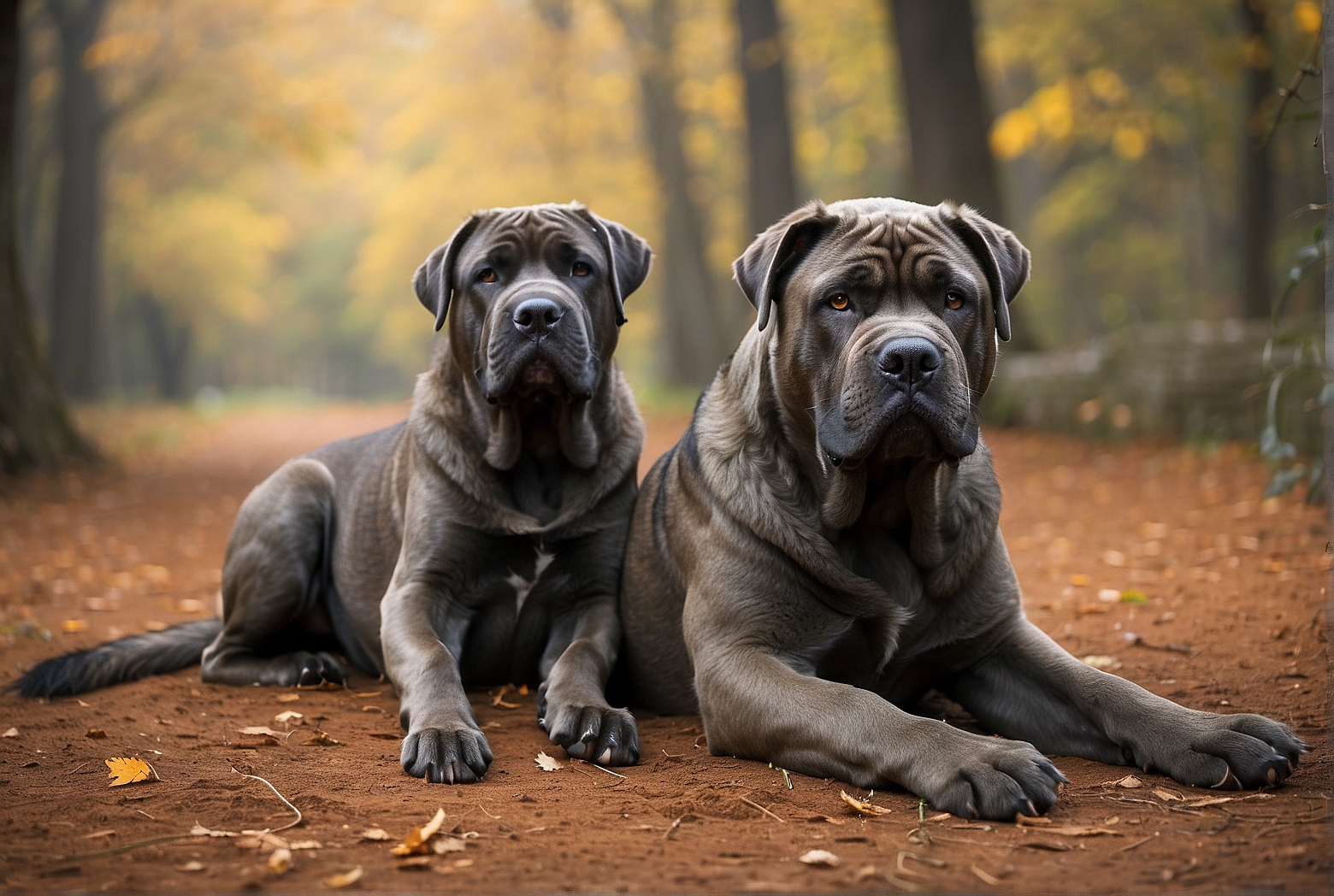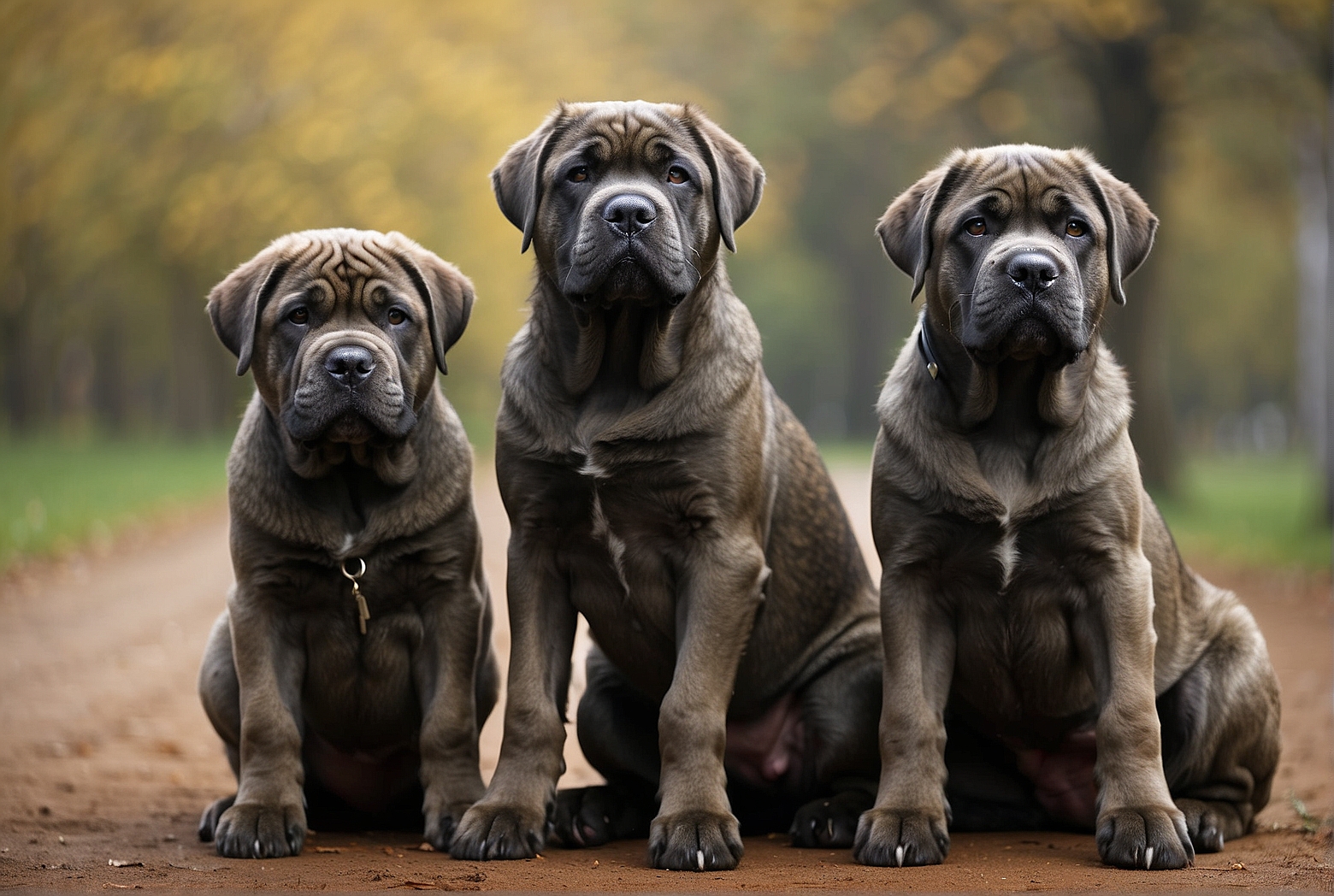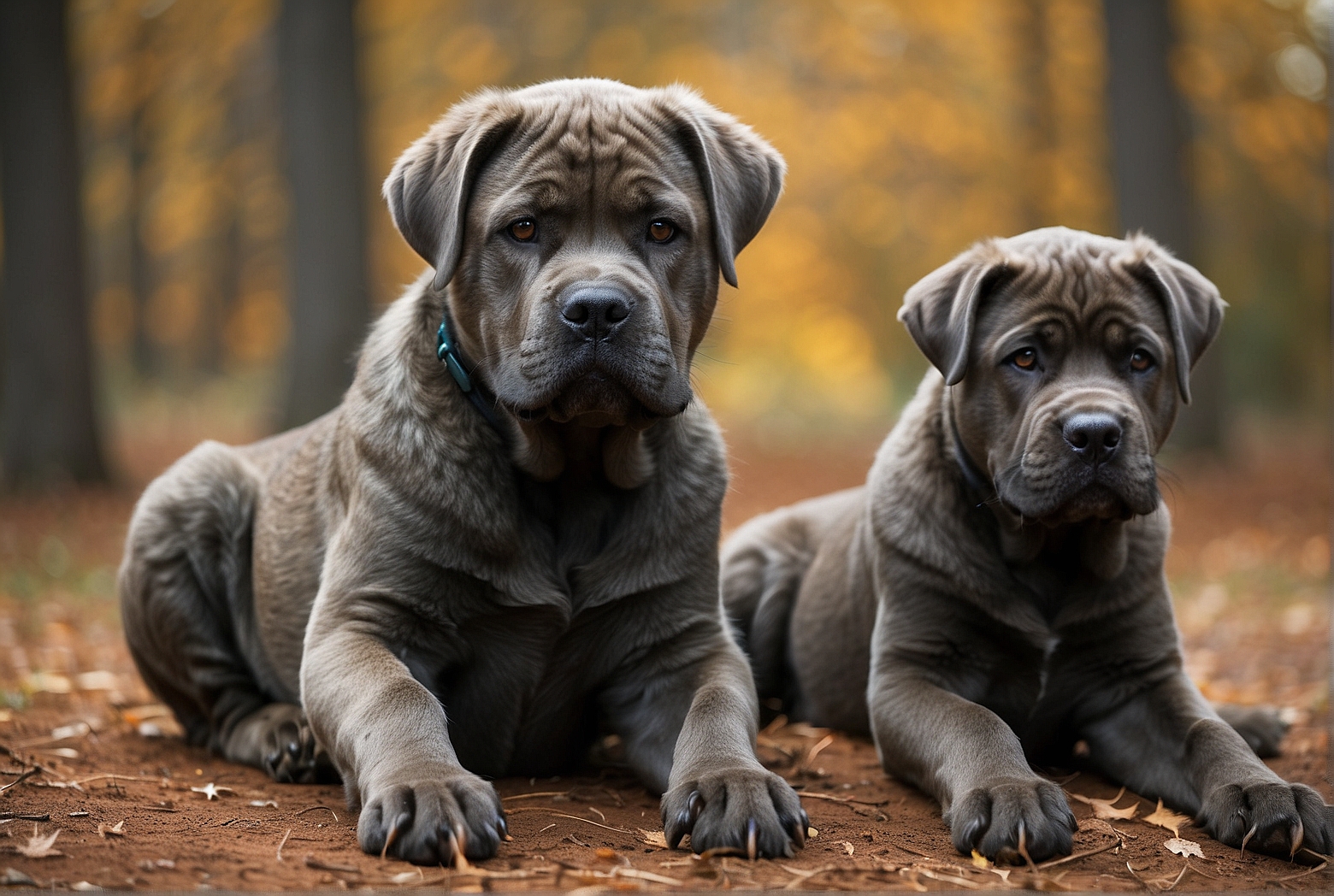Have you ever wondered at what age your Cane Corso will begin to show their protective instincts? Well, wonder no more! In this article, we will explore the fascinating topic of when Cane Corsos typically become protective. From their early puppy stages to adulthood, we will uncover the key milestones in their development that can shape their protective behavior. Whether you’re a proud owner of a Cane Corso or simply curious about these magnificent dogs, this article will provide valuable insights into their protective nature. So, let’s embark on this journey together and discover the age when Cane Corsos truly become protective.
Physical and Mental Development of Cane Corsos
Cane Corsos, like many other dog breeds, go through distinct growth phases as they develop both physically and mentally. Understanding these phases and the behavioral changes that accompany them is essential for Cane Corso owners to ensure the well-being and proper development of their beloved pets.
Growth Phases of Cane Corsos
Cane Corsos generally experience four main growth phases: puppyhood, adolescence, young adulthood, and maturity. During the puppyhood phase, which typically lasts from birth to around four months of age, Cane Corsos are adorable bundles of energy. They grow rapidly, both in size and coordination, and begin exploring their surroundings with curious minds.
As the Corsos enter adolescence, which usually occurs between six and twelve months, their growth rate slows down, but their energy levels remain high. This is the point at which their protective instincts start to emerge, although they may not fully manifest until later stages of development. It is important to provide consistent training and socialization during this period to manage their increasing energy and encourage positive behavior.
Upon reaching young adulthood, around eighteen months to two years of age, Cane Corsos have typically reached their full physical maturity. They are strong, powerful dogs, ready to take on their role as protectors. However, their mental development continues, and they still rely on guidance and training to channel their protective instincts effectively.
Finally, as Cane Corsos reach maturity, around two to three years old, their physical and mental development is complete. They have become formidable guardians, displaying a strong sense of loyalty and protectiveness towards their family.

Behavioral Changes During Development
Throughout the different growth phases, Cane Corsos undergo significant behavioral changes. From their early stages as playful, curious puppies to their formidable presence as adult protectors, their personalities evolve.
During puppyhood, Cane Corsos are generally social and open to new experiences. They enjoy positive interactions with other dogs, animals, and humans. However, as they enter adolescence, they may become more cautious and reserved, developing a suspicion towards unfamiliar people or animals. This is a normal part of their protective instincts emerging, but it emphasizes the importance of early socialization to ensure a confident and well-rounded adult dog.
As young adults, Cane Corsos become more independent and self-assured. They may become more territorial and exhibit natural guardian instincts, recognizing their role in protecting the family and property. This stage requires careful training and guidance to channel their instincts appropriately and prevent any aggressive or overly protective behavior.
Once they reach maturity, Cane Corsos display a strong bond with their family and a heightened sense of vigilance. They will readily defend their loved ones against any potential threat, displaying the innate loyalty and protective nature for which the breed is renowned.
Natural Guardian Instincts
The natural guardian instincts exhibited by Cane Corsos are deeply rooted in their breed history and the traits inherited from their ancestors. Understanding the origins of these instincts and how they manifest in Cane Corsos is crucial for training and managing their protective behavior effectively.
Origins of Guardian Instincts
Cane Corsos have a rich heritage as working dogs, tracing back to ancient Roman times. They were bred for various tasks, including guarding property, livestock, and even hunting large game. These jobs required them to be alert, fearless, and protective, often working independently or alongside their human partners.

The selective breeding over centuries has resulted in the development of the Cane Corso we know today. Their strong protective instincts are deeply ingrained in their genetic makeup, making them natural guardians of their families and territories.
Inherited Traits from Ancestors
Cane Corsos inherit many traits from their ancestors that contribute to their protective nature. These include traits such as intelligence, courage, loyalty, and a strong sense of territory. These characteristics were essential for their historical roles as guardians and continue to be prevalent in the breed today.
Their intelligence allows them to assess situations quickly and react appropriately, while their courage ensures they are fearless when protecting their loved ones. Additionally, their loyalty binds them strongly to their family, motivating them to act defensively in times of danger. Lastly, their well-defined sense of territory drives their instinct to protect their home and loved ones, making them highly vigilant.
Early Socialization and Training
To ensure that Cane Corsos develop into well-rounded and protective family members, early socialization and training are of utmost importance. It is during the early stages of a Cane Corso’s life that their understanding of the world and their role within it is formed.
Importance of Socialization
Socialization encompasses exposing a Cane Corso to a variety of people, animals, and environments from a young age. By providing positive experiences and interactions, owners can help their Corsos develop a confident and balanced temperament.
Early socialization helps Corsos become comfortable in various situations and reduces any tendencies towards fear or aggression towards strangers or other animals. It teaches them appropriate ways to interact, communicate, and respond, ultimately shaping their future behavior as protectors.
Positive Reinforcement Training
Positive reinforcement training is a highly effective method for nurturing the protective instincts of Cane Corsos. This training approach focuses on rewarding desired behaviors with treats, praise, or play, thus encouraging the repetition of those behaviors.
Through positive reinforcement, Cane Corsos learn to associate protective behaviors, such as being alert or watchful, with positive experiences. This method reinforces their natural instincts while also promoting their bond with their owners. By using rewards and encouragement, owners can shape their Corsos’ behaviors and redirect any unwanted tendencies towards more appropriate responses.
Cane Corsos as Family Protectors
Cane Corsos have an innate ability to bond closely with their family members, allowing them to form deep connections and prioritize their loved ones’ protection. Understanding the bond between a Cane Corso and their family, as well as their inherent loyalty, is crucial for fostering a harmonious and secure environment.
Bonding with Family Members
Cane Corsos thrive on strong bonds with their family members, whom they see as their pack. Whether single individuals or large families, Corsos quickly become deeply attached to those they consider their own.
To strengthen the bond with your Cane Corso, spend quality time together, engaging in activities such as play, training, and exercise. This not only contributes to physical and mental stimulation but also reinforces the sense of loyalty and protection they feel towards you.
Innate Loyalty towards Family
Cane Corsos are known for their unwavering loyalty towards their family. This loyalty stems from their instinctive desire to protect and defend those they consider their own. With their protective nature and deep bond, Corsos will go to great lengths to ensure the safety and well-being of their loved ones.
Their loyalty extends beyond immediate family members, often encompassing extended family and close friends. However, it is essential to remember that proper socialization and training are crucial to ensure that this loyalty does not translate into aggression or fear towards unfamiliar individuals.
Signs of Protective Behavior
As Cane Corsos develop and mature, certain signs indicate their emerging protective behavior. Recognizing these signs allows owners to understand their Corsos better and respond appropriately to their needs.
Alertness and Watchfulness
Cane Corsos naturally possess a strong sense of awareness, which translates into heightened alertness and watchfulness. They are quick to notice any changes in their environment, including unfamiliar sounds, sights, or people.
When your Cane Corso becomes alert or watchful, it is a sign that they are assuming their role as protectors. They may hold their head high, ears erect, and focus intently on the potential source of concern. Their body language becomes more intense and focused, displaying their readiness to respond to any perceived threat.
Protective Body Language
The body language of a Cane Corso can provide valuable insights into their protective behavior. When in protective mode, Corsos may exhibit certain physical cues that signal their intent and readiness to defend.
A protective Cane Corso may stand tall with a stiff posture, raised hackles, and a focused gaze. Their tail may be held high or straight, displaying confidence and attentiveness. They may emit low growls or deep barks, which serve as vocal warnings to potential threats.
It is important for owners to understand and respect these signs of protective behavior, while also providing guidance to ensure appropriate responses within the boundaries of acceptable behavior.
Age Milestones and Protective Behavior
As Cane Corsos progress through different stages of development, their protective instincts evolve and become more pronounced. Understanding the milestones associated with their protective behavior is crucial for owners to effectively guide their Corsos’ development.
Adolescence and Emerging Guardian Instincts
During adolescence, typically between six and twelve months of age, Cane Corsos start to exhibit their first signs of guardian instincts. This phase marks the beginning of their transition from playful puppies to formidable protectors.
As their growth rate slows down, their guardian instincts begin to emerge more prominently. They may become more cautious, suspicious of unfamiliar people or animals, and demonstrate increased territorial behaviors. This is when early socialization and training become particularly important to shape their protective behavior positively.
Maturing into a Protective Adult
By the time Cane Corsos reach young adulthood, around eighteen months to two years old, they have usually reached their full physical maturity. They are now equipped with the size, strength, and protective instincts to fulfill their role as family protectors.
Throughout this maturation process, Corsos refine and strengthen their instincts while continuing to learn and respond to guidance. Responsible owners will provide ongoing training and reinforcement to ensure that their Corsos develop into well-behaved and dependable adults.
Factors Influencing Protective Behavior
Several factors contribute to the expression and development of a Cane Corso’s protective behavior. Understanding these factors can help owners nurture and manage their Corsos’ natural instincts effectively.
Genetics and Breed Characteristics
Genetics play a significant role in shaping a Cane Corso’s protective behavior. The breed’s history as working dogs and their long lineage of protective instinct selection have established a genetic predisposition towards guarding and protecting.
The temperament and protective tendencies of a Cane Corso’s parents and ancestors can offer insights into their offspring’s potential behavior. However, it is crucial to remember that genetics are not the sole determinants of behavior, and proper training and socialization are equally important in shaping a well-rounded and balanced Cane Corso.
Environment and Upbringing
The environment and upbringing of a Cane Corso also influence their protective behavior. Early socialization, exposure to various stimuli, and positive reinforcement training all contribute to shaping their behavior and ensuring they can effectively differentiate between real threats and harmless situations.
A nurturing and supportive environment, coupled with consistent training, can help Corsos develop into confident and well-behaved individuals. Conversely, a lack of socialization, improper training methods, or exposure to negative experiences can result in fear-based behaviors or an overprotective nature that may become problematic.
Cane Corsos as Guard Dogs
Due to their physical attributes, intelligence, and natural protective instincts, Cane Corsos are often considered excellent guard dog candidates. However, specific training and proper management are essential to ensure they fulfill their role effectively.
Training for Guarding Duties
Training a Cane Corso for guarding duties requires a balanced approach that combines their innate protective instincts with obedience and control. Specialized guard dog training programs, led by experienced trainers, can be beneficial in teaching Corsos how to respond appropriately to potential threats while maintaining a calm and controlled demeanor.
It is crucial to remember that guard dog training should never involve encouraging aggressive or unpredictable behavior. Instead, emphasis should be placed on teaching Corsos to assess situations, demonstrate controlled protection, and respond to commands effectively.
Balancing Protection and Socialization
While guard dog training is essential for harnessing a Cane Corso’s protective instincts, it should never come at the expense of their socialization and overall temperament. A well-rounded Cane Corso should be able to distinguish between real threats and harmless situations, while remaining calm and sociable in everyday interactions.
To achieve this balance, it is essential to incorporate ongoing socialization and exposure to various environments, people, and animals throughout their training. This ensures that Corsos maintain their ability to interact appropriately in different scenarios, while still displaying their protective nature when warranted.
Nurturing Protective Behavior
Nurturing a Cane Corso’s protective behavior involves providing them with a sense of purpose and encouraging responsible conduct. These measures help to channel their protective instincts positively and ensure they serve as reliable family protectors.
Providing a Sense of Purpose
Cane Corsos thrive when they have a sense of purpose and a job to do. Engaging them in activities that simulate their natural instincts, such as obedience training, tracking exercises, or scent work, can help nurture their protective behavior positively.
Additionally, involving them in guard dog training or specialized tasks that align with their abilities can satisfy their need for a purposeful role. By providing opportunities for mental and physical stimulation, Cane Corsos feel fulfilled and are more likely to display balanced protective behavior.
Encouraging Responsible Behavior
Encouraging responsible behavior in Cane Corsos is crucial for managing their protective instincts effectively. This includes training them to respond to commands promptly, respecting boundaries, and displaying appropriate behavior in various situations.
Owners should reinforce desirable behaviors consistently through positive reinforcement training techniques. This encourages Corsos to make choices that align with their role as protectors while maintaining self-control and obedience.
Conclusion
Understanding the protective nature of Cane Corsos is essential for providing the proper care, training, and guidance these remarkable dogs require. From their unique growth phases to their innate guardian instincts, Corsos possess the qualities necessary to be exceptional family protectors. By nurturing their natural behavior through early socialization, positive reinforcement training, and a supportive environment, owners can develop a harmonious bond with their Cane Corsos while allowing them to fulfill their role as loyal and reliable guardians.
